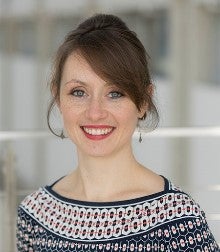Science Teaching Fellows Colloquium
 Natasha
G.
Holmes
Natasha
G.
Holmes

Assistant
Professor,
Department
of
Physics
Cornell
University
Natasha G. Holmes leads the Cornell Physics Education Research Lab. Natasha received her BSc.(Hons) in physics from the University of Guelph and her MSc and PhD in physics at the University of British Columbia. Her graduate work involved designing, implementing, and evaluating innovative pedagogies for undergraduate physics labs. She then went on to do her postdoctoral work at Stanford University working with Dr. Carl Wieman. Her research group studies many aspects of student learning, attitudes, and skill development from hands-on laboratory experiences, with a focus on critical thinking and experimentation. They also study how we know what outcomes are being achieved (how do you measure critical thinking?) and what mechanisms are responsible those outcomes.